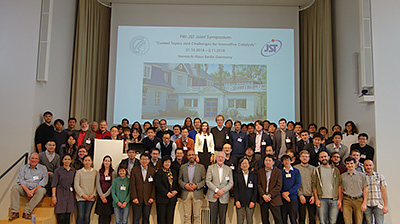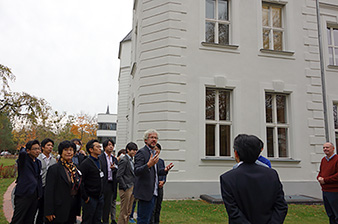December 2018
Strategic Basic Research Program
PRESTO [Innovative Catalysts] Science and Creation of Innovative Catalysts
https://www.jst.go.jp/kisoken/presto/en/research_area/ongoing/areah27-3.html
CREST [Innovative Catalysts] Innovative catalysts and creation technologies for the utilization of diverse natural carbon resources
https://www.jst.go.jp/kisoken/crest/en/research_area/ongoing/areah27-3.html
A Japan-Germany joint symposium was held at the Fritz Haber Institute (FHI) der Max Planck Institute in Germany from October 31 to November 2, 2018, themed on developing innovative catalysts technologies.
JST has supported research and development for creating innovative catalysts aiming for realization of a sustainable society, which requires the utilization of diverse natural carbon resources. Catalyst development relates to the fields of material synthesis, measurement and analysis, and theory and simulation; and it has become a global trend in chemical research along with the progress of nanotechnology. The symposium was planned for the collaboration between JST and the FHI, which is the world leading national institute in the areas of physical chemistry, especially advanced measurement techniques and theoretical study. About 100 researchers including many young researchers from Japan and Germany participated in the symposium.
At the symposium, there were 40 presentations and 50 poster exhibitions, and the joint research teams also gathered at the event. Through these opportunities, researchers actively exchanged their opinions. The themes mainly fell into three categories: 1) catalytic materials and processes that can effectively convert carbon resources such as methane; 2) measurement and analysis methods that support material development; and 3) theory and simulation methods that lead to understanding of the dynamics of catalytic reactions.
Apart from the symposium, some participants visited the FHI facilities guided by Dr. Takashi Kumagai, PI of FHI and JST’s PRESTO program. Many Japanese researchers were impressed by not only the many advanced measuring devices, but also the differences of management systems to support their smooth operation. Professor Hiroshi Kitagawa, Research Supervisor of the PRESTO—Innovative Catalysts, praised them saying, “the high-quality facility environment in national research institutions like the FHI shows that science is firmly rooted in the nation’s culture.”
The symposium was co-chaired by the representatives from both countries; Professor Hajo Freund from Germany and Professor Wataru Ueda, Research Supervisor of CREST—Innovative Catalysts, from Japan. They gave a message with positive expectation, “We hope that this symposium will be a foothold to build an international network, and successfully lead to joint research.”

